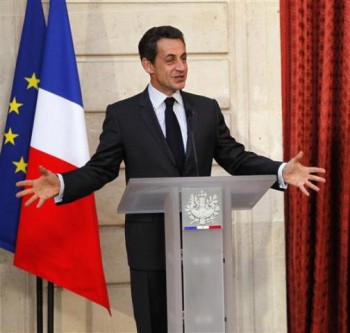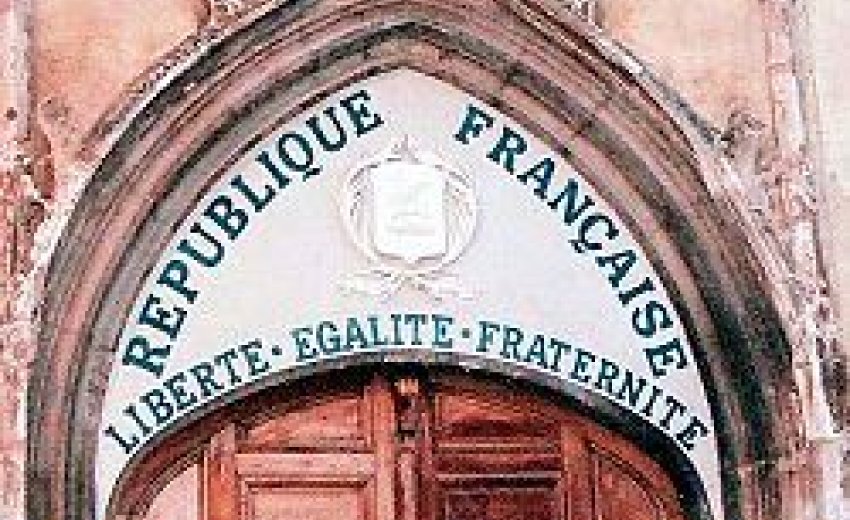France's governing party debates secularism
 (AP) PARIS (AP) — President Nicolas Sarkozy's governing conservative party held a politically charged conference Tuesday on ways to strengthen secularism in French society, amid worries it would stigmatize France's millions of Muslims.
(AP) PARIS (AP) — President Nicolas Sarkozy's governing conservative party held a politically charged conference Tuesday on ways to strengthen secularism in French society, amid worries it would stigmatize France's millions of Muslims.
The UMP were considering 26 ideas that party officials say are aimed at bringing France's stringent laws decreeing the separation of church from state into step with the times. With Europe's largest Muslim population — estimated at about 5 million — France is much changed from 1905, when the secularism laws were adopted, and they're in urgent need of revamping, the party argues.
The proposals discussed Tuesday include banning the wearing of religious symbols such as Muslim headscarves or prominent Christian crosses by day-care personnel and preventing Muslim mothers from wearing headscarves when accompanying school field trips. It also would prevent parents from taking their children out of mandatory subjects including gym and biology.
The debate could lead to a legislative bill in the National Assembly, where the UMP has a majority.
The round-table comes about a week before a new law banning garments that hide the face takes effect. Under the measure, which takes effect on April 11, women who wear the face-shrouding veils risk a fine, special classes and a police record.
The discussion also comes as Sarkozy's poll numbers continue to slide and with the far-right National Front resurgent under its new party leadership. Critics from the opposition Socialist party contend the debate is an electoral ploy aimed at appealing to voters who could be swayed by the National Front.
UMP leader Jean-Francois Cope insisted Monday that France needs clearer rules about how Muslims should adapt their religious practices to French society.
"The practice of Islam in France is not the burqa. It is not prayers in the street," he said. In some neighborhoods with large Muslim immigrant communities, the lack of mosques or prayer rooms means crowds gather on sidewalks and cobblestone streets at prayer times.
Cope tried to distance himself from the National Front. "They denounce (Muslim practices). We are making proposals" to ease social tensions, he said.
| Head of France's UMP ruling party, Jean-Francois Cope, center, answers journalists as he arrives at a UMP meeting, in Paris, Tuesday, April, 5, 2011. The UMP party is to consider 26 ideas like banning the wear of religious symbols by day-care personnel and preventing Muslim mothers from wearing head scarves when accompanying school field trips. (AP Photo/Christophe Ena) |
"We were not for this debate in the format that was presented," France's chief rabbi, Gilles Bernheim, told reporters. France also has western Europe's largest Jewish population.
 |
| French Sikhs protest the controversial law banning conspicuous religious symbols from public schools and offices, Jan. 31, 2004 (Photo: Jean-Pierre Muller/AFP-Getty Images). |
Singh Ranjit, of the group Sikhs of France, said, "This concerns all of us because we all have difficulties as religious minorities when it comes to the relationship we have with the authorities."
The debate has also taken on an international dimension.
A former foreign minister of the Comoros Islands, a largely Muslim nation in the Indian Ocean, said on the debate's sidelines that France's influence goes beyond its geographical limits.
"Unfortunately because of what they call quarrels within France, people don't measure the impact that France has all over the world."
On the eve of the roundtable, Interior Minister Claude Gueant tried to make a case for the need for the meeting — but appeared to have further angered many.
"This growth in the number of (Muslims) and a certain number of behaviors cause problems," he said in remarks carried on French radio on Monday. "There is no reason why the nation should accord to one particular religion more rights than religions that were formerly anchored in our country."
The Movement Against Racism and for Friendship Among Peoples said Tuesday that it would file a legal complaint, accusing Gueant of "Islamophobic statements."
Gueant's predecessor, Brice Hortefeux, was convicted of racism based on a complaint by the same anti-racism group over comments regarding a UMP member of North African descent. He has appealed the conviction and the higher court has yet to rule on the appeal.
In France, the interior minister is primarily in charge of police and public security but is also oversees religious affairs.
Cecile Brisson and Angela Charlton in Paris contributed to this report.
© 2011 The Associated Press.
_________
SIKHS DE France & GURDWARA SINGH SABHA FRANCE in this context state:
Singh Ranjit, of the group Sikhs of France, said:
"This concerns all of us because we all have difficulties as religious minorities when it comes to
the relationship we have with the authorities."
Press Release – (English version):
5th April, 2011
Debate on the place of worship and the French Republic, organized by the
UMP, (President political party -conservative) The French concept of laïcité is often difficult to understand for
foreigners, in part because the word itself is not easy to translate. As it
signifies the strict separation of Church and State, the closest
approximation in English is secularism.
The French concept of laïcité is often difficult to understand for
foreigners, in part because the word itself is not easy to translate. As it
signifies the strict separation of Church and State, the closest
approximation in English is secularism.
Laïcité has been for decades a warrant of equal rights of belief and respect to all religions in France. However, in recent weeks some politicians have questioned the commitment of certain ethno-religious communities to that essential principle of the French Republic. UMP, presidential political party, organized a debate on Laicïté on 5th march. Mostly all Minister were present, Francois Baroin (Budget ministry), Luc Chatel (Education ministry), Bruno Le Maire (Agriculture ministry), Valérie Pécresse (University ministry), Laurent Wauquiez (European Affaire ministry), Claude Guéant (Interior ministry), … and also most of all French religion representative were present, Gilles Bernheim, Grand Rabbin de France, Joël Mergui, Consistoire central de France, Père Matthieu Rogé, Diocèse de Paris, Jean Daniel Roque, Prostetant de France, and Sikh representative.
French Sikhs have sent a representative and a delegation (Bhai Chain Singh, Bhai Parmjit Singh Sohal, Bhai Jasvir Singh, Bhai Narinderpal Singh Chandok) to observe the debate on Laïcité.

The speaker, Mr Ranjit G. Singh, (above) Director of Public Affairs of French Sikh Community, reiterated the commitment of the Sikh community to the French Republic. This link goes back to King Louis Philippe when he sent an Ambassador of France in the kingdom Sikh Maharaja Ranjit Singh in 1835. French Sikhs may practice and express their faith freely with the 1905 law, called the law of separation of church and state. Secularism is, in principle, the guarantee of the French Cultural diversity, but nowadays, it seems it is becoming increasingly repressive. The various new laws on restrictions of freedom of religion in public schools and in public space gives a feeling of repetitive attack on religions in France.
Moreover, the French Sikhs are part of the French Republican project and French fundamental principles of :Freedom, Equality and Fraternity" are common values to Sikh Philosophy. Today, the French urban landscape is marked by Gurdwara and Goumbad (sikh dome). The Sikh identity is inextricably linked to Dastaar, the Sikh Turban, which protects sacred hairs and allows to maintain them in obvious security and hygienic conditions.
Ranjit G. Singh,
Director of Public Affairs,
Conseil des Sikhs de France
(French Sikh Council)
_________
|
The word has been used, from the end of the 19th century on, to mean the freedom of public institutions, especially primary schools, from the influence of the Catholic Church[7] in countries where it had retained its influence, in the context of a secularization process. Today, the concept covers other religious movements as well. Proponents assert laïcité is based on respect for freedom of thought and freedom of religion. Thus the absence of a state religion, and the subsequent separation of the state and Church, is considered a prerequisite for such freedom of thought. Proponents maintain that laïcité is thus distinct from anti-clericalism, which actively opposes the influence of religion and the clergy. Laïcité relies on the division between private life, where adherents believe religion belongs, and the public sphere, in which each individual, adherents believe, should appear as a simple citizen equal to all other citizens, devoid of ethnic, religious or other particularities. According to this conception, the government must refrain from taking positions on religious doctrine and only consider religious subjects for their practical consequences on inhabitants' lives. Supporters argue that Laïcité by itself does not necessarily imply any hostility of the government with respect to religion. It is best described as a belief that government and political issues should be kept separate from religious organizations and religious issues (as long as the latter do not have notable social consequences). This is meant to protect both the government from any possible interference from religious organizations, and to protect the religious organization from political quarrels and controversies. Critics of laïcité argue that it is a disguised form of anti-clericalism and individual right to religious expression, and that, instead of promoting freedom of thought and freedom of religion, it prevents the believer from observing his or her religion. In Europe today, the controversy often centers around banning of wearing hijab, taxpayers' rights to religious choice in education services and restrictions placed on the construction of new mosques. In the United States, it centers around school prayer, creationism and related issues. Another critique is that, in countries historically dominated by one religious tradition, officially avoiding taking any positions on religious matters favors the dominant religious tradition of the relevant country. They point out that even in the current French Fifth Republic (1958–), school holidays mostly follow the Christian liturgical year, even though Easter holidays have been replaced by Spring holidays, which may or may not include Easter, depending on the years. However, the Minister of Education has responded to this criticism by giving leave to students for important holidays of their specific religions, and food menus served in secondary schools pay particular attention to ensuring that each religious observer may respect his religion's specific restrictions concerning diets. Laïcité in France The principle of laïcité in France is implemented through a number of policies. The French government is legally prohibited from recognizing any religion (except for legacy statutes like those of military chaplains and the local law of Alsace-Moselle). Instead, it recognizes religious organizations, according to formal legal criteria that do not address religious doctrine: whether the sole purpose of the organization is to organize religious activities (so that, for instance, the pretense of being a religious organization is not used for tax evasion) whether the organization disrupts public order. Laïcité was first established in public education with the 1880s Jules Ferry laws, voted after the fall of the reactionary Public morality government following the 16 May 1877 crisis. French political leaders, though not prohibited from making religious remarks, generally refrain from demonstrating openly that their policies are directly inspired by religious considerations. Christine Boutin, who openly argued on religious grounds against a legal domestic partnership available regardless of the sex of the partners, including homosexual couples (see PACS), was quickly marginalized.[citation needed] Religious disputation is generally considered incompatible with reasoned political debate. Of course political leaders may openly practice their religion (for instance, president Nicolas Sarkozy is a Christian, specifically a Catholic), but they are expected by some to refrain from mixing their private religious life with their public functions. The term was originally the French equivalent of the term laity, that is, everyone who is not Catholic clergy. After the French Revolution this meaning changed and it came to mean keeping religion separate from the executive, judicial, and legislative branches of government. This includes prohibitions on having a state religion, as well as for the government to endorse any religious position, be it a religion or atheism. Although the term was current throughout the nineteenth century, France did not fully separate church and state until the passage of its 1905 law on the separation of the Churches and the State, prohibiting the state from recognizing or funding any religion. All religious buildings in France (mostly Catholic churches, Protestant temples and Jewish synagogues) became the property of the City councils. Those now have the duty to maintain the (often historical) buildings but can't subsidize the religious organizations using them. In areas that were part of Germany at that time, and which did not return to France until 1918, some arrangements for the cooperation of church and state are still in effect today (see Alsace-Moselle). Laïcité is currently a core concept in the French constitution, whose Article 1 formally states that France is a secular republic ("La France est une République indivisible, laïque, démocratique et sociale.") Many see being discreet with one's religion as a necessary part of being French. This has led to frequent divisions with some non-Christian immigrants, especially with part of France's large Muslim population. A recent debate has been over whether any religious apparel or displays by individuals, such as the Islamic hijab, Sikh turban, (large) Christian crosses and Jewish Stars of David, should be banned from public schools. Such a ban came into effect in France in 2004, see French law on secularity and conspicuous religious symbols in schools. In spring 2011 there has been a reinforcement of laicité in hospitals advocated by the Minister of the Interior, Claude Guéant, in public service generally by the official non-discrimination agency, la HALDE, and the simultaneous broadcasting of the traditional Protestant and Catholic Lent Sermons (operating since 1946) has been interrupted. Earlier the broadcasting of the Russian Orthodox Christmas night liturgy was similarly stopped on 6/7 January The strict separation of church and state which began with the 1905 law has evolved into what some see as a "form of political correctness that made bringing religion into public affairs a major taboo."[8] President Sarkozy has criticised this approach as a "negative laicite" and wants to develop a "positive laicite" that recognizes the contribution of faith to French culture, history and society, allows for faith in the public discourse and for government subsidies for faith-based groups.[8] Sarkozy sees France's main religions as positive contributions to French society. He was elected on a platform proposing a modernisation of the Republic’s century-old principle of laicite.[9][not in citation given] He visited the Pope in December 2007 and publicly acknowledged France's Christian roots, while highlighting the importance of freedom of thought,[10] hinting that faith should come back into the public sphere. Sarkozy publicly declared the burqa "not welcome" in France in 2009 and favored legislation to outlaw it, following which in February 2010 a post office robbery took place by two burqa-clad robbers, ethnicity unknown, who after entering the post office, removed their veils.[11] In line with Sarkozy's views on the need for reform of laïcité, Pope Benedict XVI on September 12, 2008 said it was time to revisit the debate over the relationship between church and state in, advocating a "healthy" form of laïcité.[12] Meeting with Sarkozy, he stated : "In fact, it is fundamental, on the one hand, to insist upon the distinction between the political realm and that of religion in order to preserve both the religious freedom of citizens and the responsibility of the state toward them." [12] He also stated: "On the other hand, [it is important] to become more aware of the irreplaceable role of religion for the formation of consciences and the contribution which it can bring to – among other things – the creation of a basic ethical consensus within society.”[12] Following March 2011 local elections strong disagreement appeared within the governing UMP over the appropriacy of holding a debate on laicité as desired by the President of the Republic. On 30 March a letter appeared in La Croix signed by representatives of six religious bodies opposing the appropriacy of such a debate. |

